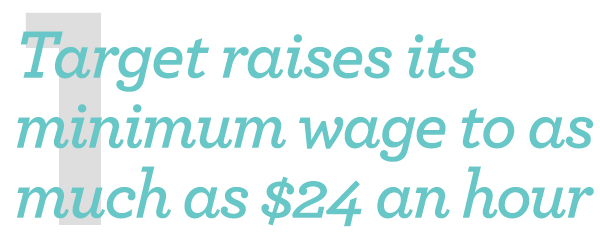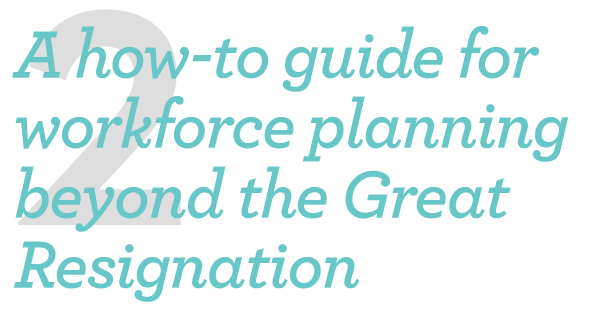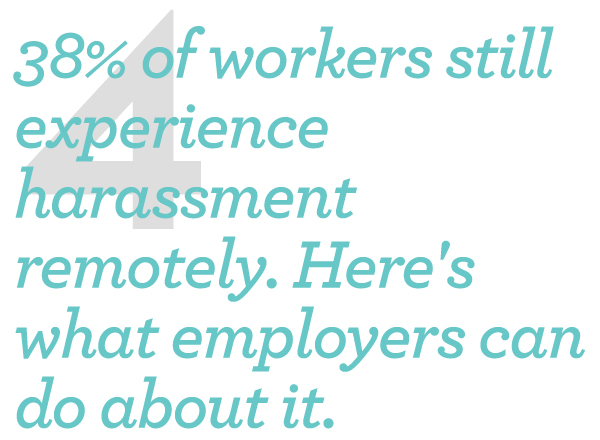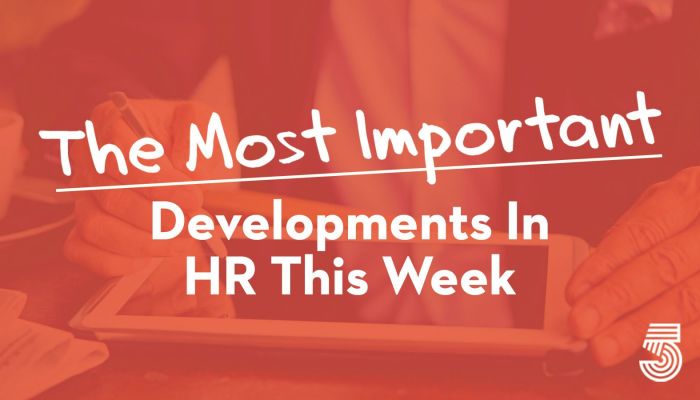The M.I.D., as we call it, is curated by our editorial team from more than 50 news sources. Like a lot of good ideas, this started as something I wanted for myself. If I can’t read everything, I at least want to stay abreast of the most important developments.
This week in HR, Target raised its minimum wage to $24 in the tightest markets, workforce planning took center stage, lessons about change management arose from a podcast, remote worker harassment was a thing, and SHRM suggested HR look at social factors when doling out benefits.


Workers at Target stores and distribution centers in places like New York, where competition for finding and hiring staff is the fiercest, could see starting wages as high as $24 an hour this year. The Minneapolis-based discount retailer said Monday that it will adopt minimum wages that range from $15 to $24 an hour, with the highest pay going to hires in the most competitive markets. It currently pays a universal starting wage of $15 an hour. The new starting wage range is part of a company plan to spend an additional $300 million on its labor force this year that will also include broader, faster access to health care coverage for its hourly workers. “The market has changed,” said Target CEO Brian Cornell in an interview with The Associated Press. “We want to continue to have an industry-leading position.” Target set a new marker for the retail industry back in 2017 when it announced it would increase hourly wages to $15 by 2020. But U.S. labor-market dynamics have changed during the pandemic, with many employers facing severe worker shortages. And many of Target’s rivals are now paying a minimum of $15 per hour or more. CBS News


Whether you call it the Great Resignation, Great Reset or simply a calibration of what workers value and want from today’s work environments, the outcome is the same: an abundance of uncertainty and change concerning the workforce. Exhausted HR teams that have spent the last two years undertaking a herculean effort to sustain our organizations in the midst of a global pandemic are on the front lines of addressing these challenges. Is it even possible to plan for tomorrow in this environment? Can we stop and take the time to look forward when every day we face urgent needs right in front of us? Well, yes — and I’d say it is essential. Organizations cannot ignore the hard work required to actually change the factors causing organizational stress, such as silos, uncertainty, and workloads. For the human resource function, this crucial path leads back to workforce planning: Regardless of what products we make or services we offer, people are at the center of our achievements. HR Executive


Ideacast hosts Alison Beard and Curt Nickisch, senior editors at Harvard Business Review, talk to Keith Ferrazzi, founder of the consulting firm Ferrazzi Greenlight, who led a survey of more than 2,000 executives to study how they reengineered operations during the pandemic. The research identified a kind of extreme adaptability at the team and organizational levels that helped some companies come out on top. Ferrazzi argues that after months of ruthlessly adapting, leaders should continue on a path of resilience and agility to stay competitive in the post-Covid-19 world. And he offers concrete steps to take. Ferrazzi is a coauthor of the new book “Competing in the New World of Work: How Radical Adaptability Separates the Best from the Rest.” HBR Ideacast


Although the shift in workplace dynamics and embrace of remote work has had its benefits, according to AllVoices’ “The State Of Workplace Harassment” report, 38% of employees still experienced harassment remotely, through email, video conferencing, chat apps or by phone. Additionally, 24% believe harassment continues or gets worse through remote work channels. The study suggests that employers implement an anonymous harassment reporting platform so workers can report on any workplace harassment without dealing with any repercussions. According to the report, 85% of workers are more likely to report harassment if they have an anonymous channel. Additionally, respondents believe that they and their coworkers would be more encouraged to report with an anonymous reporting tool or platform. CNBC


Employers are becoming more aware that social factors, such as where employees live, what food they have access to and how much money they make, can significantly affect workers’ health and well-being. These and other so-called social determinants of health (SDoH) are closely associated with health outcomes, especially among lower-income workers and those from historically marginalized groups. In February, the nonprofit Northeast Business Group on Health (NEBGH), representing employers that sponsor health benefit plans, released Social Determinants of Health: A Guide for Employers, to help HR and benefits leaders identify and address the health-related social needs of employees and their families. The 48-page guide lists the main SDoH as: Economic stability, education access and quality, health care access and quality, neighborhood and environment, social and community context. Employers can take steps to address the social needs of their employees by: Collecting data using a health risk assessment tool or an employee survey, assessing benefits designs with equity in mind, providing health benefits education and financial counseling, reviewing what benefits might not be offered (e.g., caregiving, tuition reimbursement). SHRM










